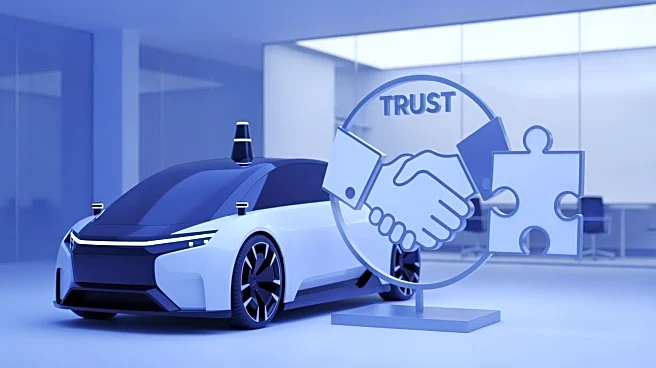What's Happening?
The advent of self-driving cars is transitioning from a futuristic concept to a present-day reality, with significant implications for urban environments and transportation systems. James Philbin, Head
of Autonomy and AI at Rivian, and Charlie Tyson, Technology Activation Director at Michigan's Office of Future Mobility & Electrification, are at the forefront of this transformation. They recently discussed strategies to build public trust in autonomous vehicles during a Business Insider event. The conversation highlighted the challenges and opportunities associated with integrating self-driving technology into everyday life, focusing on safety, infrastructure adaptation, and public acceptance. The event also featured insights from industry leaders such as Johann Jungwirth of Mobileye and Stephen Hayes of Lyft, emphasizing the collaborative efforts required to advance autonomous vehicle technology.
Why It's Important?
The integration of self-driving cars into mainstream transportation systems holds the potential to revolutionize urban mobility, reduce traffic congestion, and enhance road safety. However, public trust remains a critical barrier to widespread adoption. Building confidence in the technology is essential for its success, as it involves addressing concerns about safety, reliability, and the impact on existing infrastructure. The discussions led by Rivian and Michigan's Office of Future Mobility & Electrification underscore the importance of transparent communication and rigorous testing to ensure that autonomous vehicles can safely coexist with human-driven cars. The outcome of these efforts could significantly influence the future of transportation, affecting industries ranging from automotive manufacturing to urban planning.
What's Next?
As self-driving technology continues to evolve, stakeholders are likely to focus on pilot programs and real-world testing to demonstrate the safety and efficiency of autonomous vehicles. These initiatives will be crucial in gathering data, refining technology, and building public confidence. Automakers, technology companies, and government agencies are expected to collaborate closely to address regulatory challenges and develop standards for autonomous vehicle operation. The success of these efforts will depend on the ability to effectively communicate the benefits and address the concerns of consumers, paving the way for broader acceptance and integration of self-driving cars into daily life.
Beyond the Headlines
The shift towards autonomous vehicles also raises ethical and legal questions, such as liability in the event of accidents and the impact on employment in the driving sector. As technology advances, policymakers will need to consider these implications and develop frameworks that balance innovation with societal needs. Additionally, the environmental impact of self-driving cars, particularly in terms of energy consumption and emissions, will be a critical factor in shaping public perception and regulatory approaches.











